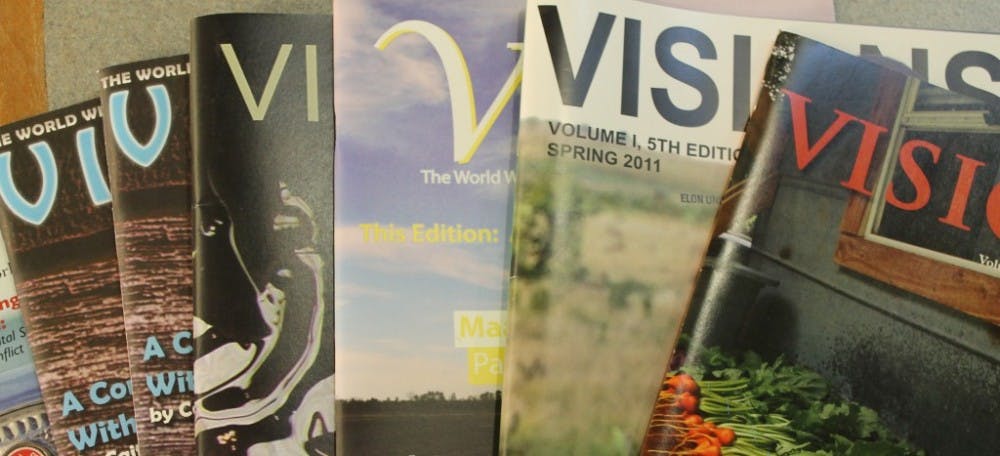Visions Magazine begins every issue with a dedication to the Earth and a hopeful message for an environmentally peaceful world.
The magazine is Elon University’s non-partisan, peer-reviewed publication, which collates a diverse selection of student pieces concerning the environment. The aspiration of the interdisciplinary magazine is to allow students to experience the professional publication process while simultaneously bridging the gap between the individual and nature.
Michele Kleckner, sustainability faculty fellow and senior lecturer in computing sciences, has worked with the magazine since its launch.
“The attempt was an environmental stewardship focus including students from many disciplines, not just exclusively from the environmental studies program,” Kleckner said. “We aim to get a diverse selection of stories from across campus, artwork too.”
The magazine collects submitted pieces through each fall semester. During the start of spring term, the faculty-selected student editorial staff, along with several faculty consultants, begins the process of evaluating pieces for the annual publication.
A variety of writing pieces and artwork was selected for several sections, which include photography, poems, short stories, personal essays, academic features and book reviews.
[quote]“The main thing Visions looks for are pieces that go beyond the standard ‘love the environment’ story.” - Adriana Miano, former creative writing editor for Visions[/quote]
Founded about the same time Elon adopted its environmental studies major in 2007, the magazine originally had greater aspirations. Visions Magazine conceptually aimed to be a national magazine produced through Elon to which undergraduates from across the nation could submit pieces with an environmental focus. This sort of publication did not exist at the time and after a great deal of deliberation, Visions decided to start small and potentially expand in years to come.
“[Today,] Visions is principally a publication for Elon students by Elon students,” Kleckner said.
Class of 2013 alumna and English major Adriana Miano served as a creative writing student editor for last year’s publication.
“The main thing Visions looks for are pieces that go beyond the standard ‘love the environment’ story,” Miano said. “[We looked for] more multi-dimensional pieces that really touched on something human. You hear people say all the time that the environment matters, but this really gets to the emotion of why that is. It looks to capture that ‘why.’”
An example of this emotional connection can be found in Class of 2013 alumna Jacqueline Alnes’ creative writing piece, “Like Features.” Alnes said she was inspired to write the piece when her home was hit by a tornado in Branson West, Mo., in January 2012.
“Thankfully no one was home at the time, but there were people at the neighbors’ house,” Alnes said. “My room was actually the most destroyed and our whole roof was blown to the other side of the lake we live on. We ended up having to completely rebuild.”
The disaster nurtured an awareness and respect for nature, not fear, Alnes said. She is currently pursuing her MFA in creative nonfiction from Portland State University and was inspired by the works of Willa Cather and James Galvin to examine human interaction with a more personified version of the environment.
Many students are similarly inspired by unique natural phenomena.
“I love seeing how kids at Elon peruse similar subject matter in different ways,” Alnes said. “For me, it’s hard to talk to my peers about their passions and ongoing projects, but by putting them into a publication, like Visions, I get that in-depth look. And the interaction between different majors around the same subject material is a great catalyst for discussion by students and professors inside and out of the classroom.”
The publication also gives scholarly research-based writers the chance to work directly with discipline-specific reviewers. Last year, Class of 2013 graduate Kara Durante was able to work directly with Brant Touchette, professor of biology and environmental studies chair, to review her article, “Coral Reefs: A Deeper Look.” Visions Magazine combines this type of scholarship with a professional review and publication process.
Associate English professor Cassie Kircher, who has traditionally served as a faculty consultant for Visions Magazine, said the magazine is not lacking in quality but in attention from the student body. She said faculty members are currently considering how to better guide the magazine in a more successful direction.
[quote]“[Visions Magazine has] slipped under the radar in the past few years.” - Cassie Kircher, associate English professor and faculty consultant for Visions[/quote]
The magazine is also currently seeking greater student involvement and submissions.
“You can’t scientifically separate the environment from any part of our lives,” said past student editor and alumna Jill Capotosto. “It’s too easy to view the environment as something separate, so having a publication open to these pieces really gives students a chance to be better exposed to that relationship. It’s something so integral to everything, always.”


